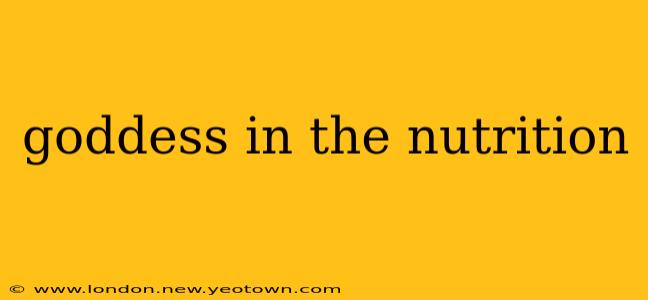For years, the world of nutrition has been dominated by restrictive diets and rigid rules. We’ve been bombarded with messages about "good" and "bad" foods, calorie counting, and the endless pursuit of the perfect body. But what if I told you there's a different path? A path that celebrates your body's wisdom, honors your hunger cues, and empowers you to create a joyful and sustainable relationship with food? This is the path of the "Goddess in the Nutrition," a philosophy centered around intuitive eating.
This isn't just another diet; it's a journey of self-discovery, a rebellion against the tyranny of food rules, and a celebration of your body's inherent intelligence. It's about listening to your inner wisdom, respecting your body's signals, and nourishing yourself with kindness and compassion.
What is Intuitive Eating?
Intuitive eating is a revolutionary approach to nutrition that emphasizes trusting your body's natural hunger and fullness cues. It rejects the restrictive dieting mentality and encourages a mindful and joyful relationship with food. Instead of following rigid rules and tracking calories, you learn to tune into your body's signals and make food choices based on your physical and emotional needs.
It's about rediscovering the innate wisdom your body possesses—a wisdom often drowned out by years of diet culture messaging. Think of it as reclaiming your power over your own body and your relationship with food.
Is Intuitive Eating Right for Me?
This is a question many ponder. The truth is, intuitive eating can be beneficial for a wide range of individuals, especially those who:
- Are tired of yo-yo dieting: The constant cycle of restriction and binge eating is exhausting and detrimental to both physical and mental health. Intuitive eating offers a path to freedom from this cycle.
- Struggle with body image issues: Intuitive eating helps shift focus from weight and appearance to overall well-being and self-acceptance.
- Have a history of disordered eating: While not a treatment for eating disorders, intuitive eating can be a supportive component of recovery, fostering a healthier relationship with food and body.
- Want a more sustainable and enjoyable approach to nutrition: Restrictive diets are often unsustainable in the long run. Intuitive eating promotes a balanced and enjoyable way of eating that can last a lifetime.
How Does Intuitive Eating Work?
Intuitive eating isn't a quick fix; it's a process that requires patience, self-compassion, and a willingness to unlearn ingrained habits. It involves gradually incorporating the following principles:
- Rejecting diet mentality: Completely letting go of the idea that certain foods are "good" or "bad" is crucial.
- Honoring your hunger: Paying attention to your body's hunger cues and eating when you're truly hungry.
- Making peace with food: Allowing yourself to eat all foods without judgment or restriction.
- Challenging the food police: Ignoring the internal voice that criticizes your food choices.
- Discovering the satisfaction factor: Paying attention to your body's signals of fullness and stopping when you feel satisfied, not stuffed.
- Respecting your body: Acknowledging and accepting your body's natural shape and size.
- Honoring your feelings without using food: Developing healthy coping mechanisms for emotions instead of turning to food for comfort.
- Respecting your body's biological cues: Learning to differentiate between true hunger and other cravings.
Can Intuitive Eating Help with Weight Management?
While intuitive eating isn't primarily about weight loss, many people find that it can lead to a healthier weight naturally. By listening to your body and eating when you're hungry, you're more likely to choose nutrient-dense foods and avoid overeating. The focus shifts from weight management to overall well-being, which often results in a healthier relationship with food and body.
What are the potential drawbacks of Intuitive Eating?
While generally beneficial, intuitive eating may not be suitable for everyone, particularly those with severe eating disorders. It requires self-awareness, patience, and a willingness to unlearn ingrained dietary habits. Some may find the initial process challenging, requiring professional guidance to navigate the complexities.
How can I start practicing Intuitive Eating?
The journey to intuitive eating is personal. Start by gently challenging your ingrained dietary beliefs. Begin paying attention to your body's hunger and fullness cues, and slowly integrate the principles outlined above. Remember, it's a process, not a race. Be patient and kind to yourself.
Embracing the "Goddess within" is not about achieving perfection; it’s about cultivating a deeply nourishing relationship with yourself and your body. It’s about reclaiming your power and celebrating the incredible wisdom your body possesses. It’s about nurturing your mind, body, and soul with food that nourishes you from the inside out. The journey to intuitive eating is a journey to self-discovery and empowerment – a journey well worth taking.

